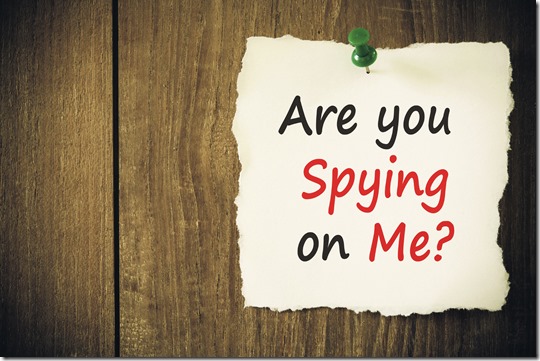This May Make You Paranoid. Read It Anyway.
When I’m in the shower
I’m afraid to wash my hair
‘Cause I might open my eyes
And find someone standing there
People say I’m crazy
Just a little touched
But maybe showers remind me of
“Psycho” too much
That’s why
I always feel like somebody’s watching me
– “Somebody’s Watching Me” by Rockwell (1984)

Sometimes, it’s difficult to tell the difference between paranoia and appropriate caution. I’ve written about the risks of speaking too loudly in public spaces before, and each time I do, I can’t help wondering whether readers will think I’m engaging in unrealistic fear mongering.
So when our firm’s vice president forwarded me a link to a story I missed a while back, I felt a combination of horror and vindication. It seems my paranoia, if anything, has been understated.
Amy Webb, a reporter for Slate, calls herself “The Acela Spy.” Not only does Ms. Webb pay attention to the conversations around her—but she actively looks at the names on passenger tickets and chooses her seat accordingly.
“It’s astonishingly easy to become an Acela spy—even if you don’t really want to be a part of other riders’ business—as I have learned from years of experience. Until very recently, all Amtrak tickets were paper-based, and the tickets looked a lot like airline boarding passes. In addition to the train and destination information, they included the passenger’s full name in the upper left-hand corner. Also until recently, those tickets were wedged between the top of the cushion and the hard back of each seat, with the name showing for anyone who desired to look. (E-tickets on mobile phones are starting to replace paper tickets for some riders.)
It has been my practice to board the train, and then walk up and down the aisle to glance at the names on those tickets…Shortly after we leave the station and I’ve done my rounds, the mobile phones invariably come out. When they do, I take note of who’s talking, what’s being said, and the name I saw on the ticket.”

Those conversations are often rather damning. In one case, had she chosen to, Webb could have publicly identified two male bankers whose conversation would, at the very least, have made their next day at the office awkward.
“Soon, their conversation turned to a female co-worker who’d returned from maternity leave. Sales guy complained aggressively that while she’d been out of the office for so long, the software they used had upgraded. There was no way she’d ever get caught up, he argued. She had the audacity to put in for a promotion, after being gone for three months!
HR guy concurred. Women were a major distraction, holding back productivity and advancement at their bank. It was a shame they couldn’t legally fire a woman for getting—or even wanting to get—pregnant.”
Webb’s conclusion is very similar to the one I’ve offered several times, both on this blog and in The Media Training Bible:
“The problem is that trains—even in first class, where I’ve observed the worst offenders—aren’t private. They’re very public venues, just like Twitter. And just like on Twitter, sometimes we forget that we’re actually on stage as we reveal our own worst private selves to the outside world.”
I agree with Webb’s conclusions that conversations, in public and at normal volume, are ethically reportable. But the ethics of eavesdropping on unwilling participants—someone making an obvious effort to shield their work or whisper, for example—are less clear.
Either way, Webb has helped justify my paranoia. You will probably be well served if you imagine that she’s always seated next to you—at every restaurant, at every party, and on every airplane.



True story: I was researching a series on gambling nationwide in the late 1990s and interviewed several top casino executives. It was all very cordial. Several weeks later, I got a call from the head of a nationwide gambling prevention organization. It seems that his vice president unwittingly sat behind the head of a casino and one of his staff members on an airplane. They discussed me by name, and my reporting, and also discussed plans on smearing me and my motives, which they assumed were against them. Thanks to their stupidity, I got a heads up on their plans. It didn’t alter my reporting at all, or the series. It amused me more than anything. But it’s always made me lower my voice in public. You. Just. Never. Know.